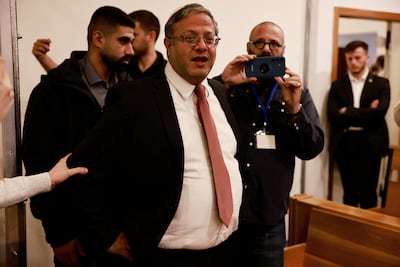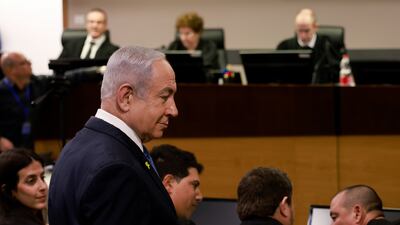Israeli Prime Minister Benjamin Netanyahu said on Tuesday that allegations made against him in an unprecedented corruption trial are “simply ridiculous” during the first day of testimony.
Mr Netanyahu is the first leader in Israel's history to go on trial while in office. He will have to be in court for about six hours a day, two to three days a week throughout December. For security reasons, the hearings are being held in an underground area of the Tel Aviv District Court.
Mr Netanyahu, who denies any wrongdoing, is on trial in three corruption cases, which include charges of fraud, bribery and breach of trust. The most serious, Case 4000, involves accusations that he used his authority to help telecoms tycoon Shaul Elovitch financially in return for positive coverage in a media outlet owned by Mr Elovitch.
Case 2000 accuses the Prime Minister of attempting to secure more positive coverage with one news outlet in exchange for legislative action to weaken one of its rivals. Case 1000 centres on allegations that Mr Netanyahu and his wife received luxury gifts illegally from a Hollywood executive in exchange for help with US visa and tax issues.
The first few days of testimony will involve questions from his defence lawyers, followed by the prosecution, after which the defence will call the Prime Minister a second time for clarifications.
Mr Netanyahu used much of the trial's first day to rail against the Israeli media. He argued that his engagement with press tycoons was not corruption but a bid to bring in “existentially needed investment” to save Israeli democracy by shaking up an overly left-wing media.
“There has never been such a biased media in any democracy, possibly in any country on Earth, as there is in Israel,” he said.
As predicted by many Israeli legal analysts, Mr Netanyahu did not deny signing questionable documents that are being referenced in the trial, instead saying that his staff did not properly explain them when they were presented.

Mr Netanyahu had tried to delay his testimony by arguing that it would distract him from managing Israel’s security situation. His effort was eventually unsuccessful, deepening the rift between the Prime Minister and his supporters and Israel’s judiciary, particularly the attorney general.
At a press conference on Monday evening, Mr Netanyahu said he had waited “eight years to tell the truth” and railed against the judiciary and the authorities. “They arrest dozens of people around me, they ruin their lives, they extort them with threats so they will give false testimony,” he said.
Members of Mr Netanyahu’s far-right coalition, which launched a polarising campaign to transform Israel’s judicial system when it came into office two years ago, attended the hearing to show their support.
Speaking outside the courthouse, National Security Minister Itamar Ben-Gvir said Mr Netanyahu was the victim of a campaign of persecution. Justice Minister Yariv Lavin, who led the judicial reform effort, earlier released a statement in which he said that Mr Netanyahu was a victim of injustice.
Supporters, including fellow Likud party politicians and media advisers, were in the courtroom for the start of the hearing.
Noga Tarnopolsky, a journalist at the trial, said: "Time will tell whether the Netanyahu approach will persuade the judges or not. But for those who have long followed Netanyahu, the slippery, interview-averse politico, he of bombast and facile issue-avoidance, it is interesting to see how much he enjoys the nitty-gritty of the staffing and internal politics of various media outlets, tensions among the staff, the behind-the-scenes manipulating of the public space."


